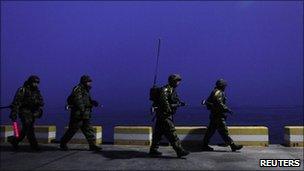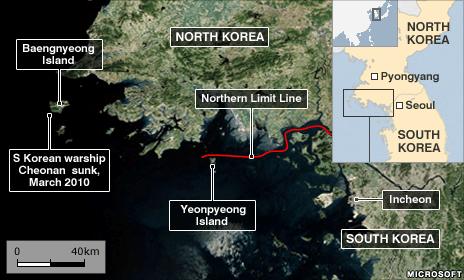South Korea and US 'plan more drills' amid N Korea fear
- Published

Soldiers have moved in on Yeonpyong island after last Tuesday's shelling by North Korean forces
South Korea is planning to hold more military exercises, after its joint naval manoeuvres with the United States end in the Yellow Sea on Wednesday.
Seoul officials said they were in talks with Washington to stage further naval drills, possibly as soon as this month.
A US aircraft carrier arrived in the region last week shortly after the North shelled a South Korean island.
China has issued no direct public criticism of North Korea but says it is concerned about the naval drills.
China has said the most pressing task is to avoid further escalating tensions on the Korean peninsula.
Chinese Foreign Minister Yang Jiechi said those involved should exercise restraint and work towards resolving the situation through dialogue.
China - North Korea's main ally - does not seek to "protect any side", he was quoted as saying by the state-run Xinhua new agency.
China has called for an emergency meeting of members of the six nations involved in talks on North Korean nuclear disarmament.
North Korea's Choe Thae-bok, an aide to leader Kim Jong-il, is in Beijing.
China's state councillor Dai Bingguo has been invited to Pyongyang, unconfirmed reports from Beijing say.
The AFP news agency reports that China has blocked any formal UN censure of North Korea for last week's shelling.
Stalled talks
A South Korean Joint Chiefs of Staff officer said that Seoul and Washington were planning new military drills off South Korea's west coast.
The officer, speaking on condition of anonymity, said talks were focused on whether these would take place this month or next.
Separately, South Korea is planning what it calls routine week-long naval live-fire exercises from 29 sites around the country.
These are due to start next week and continue for several weeks.
China, however, has expressed its anger at the joint US-South Korean military exercises - which were planned before North Korea's shelling of Yeonpyong island last week.
Washington says the drills are purely defensive in nature.
China has also been pressing for a resumption of the six-nation talks on ending North Korea's nuclear programme.
The US has said these talks cannot resume until North Korea apologises for its torpedoing of a South Korean warship in March, and stops further nuclear enrichment plants from operating.
The six-party talks, involving the two Koreas, the US, China, Japan and Russia, have been stalled since April 2009.
Analysts say diplomacy has been further complicated by the recent leak of diplomatic cables by whistle-blowing website Wikileaks.
